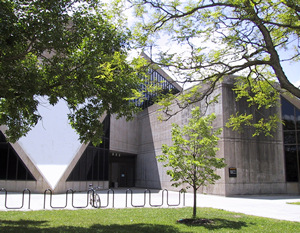 The Hardin Library for the Health Sciences serves the combined information and research needs of the University of Iowa Colleges of Dentistry, Medicine, Nursing, Pharmacy, Public Health, the University of Iowa Hospitals & Clinics (including related allied-health education programs), and the Department of Communication Sciences and Disorders. The mission of the Hardin Library is to disseminate health sciences information to the students, faculty, and staff of the university in support of education, research, and health care, and to preserve the scholarly record for the future. [See also: Hardin Library for the Health Sciences – a Photographic History]
The Hardin Library for the Health Sciences serves the combined information and research needs of the University of Iowa Colleges of Dentistry, Medicine, Nursing, Pharmacy, Public Health, the University of Iowa Hospitals & Clinics (including related allied-health education programs), and the Department of Communication Sciences and Disorders. The mission of the Hardin Library is to disseminate health sciences information to the students, faculty, and staff of the university in support of education, research, and health care, and to preserve the scholarly record for the future. [See also: Hardin Library for the Health Sciences – a Photographic History]
Hardin Library for the Health Sciences is part of the University of Iowa Libraries. The library, built in 1974, combined the previously separate medical, dental, pharmacy, nursing, and speech pathology collections. In 1988, its name was changed from the Health Sciences Library to the Hardin Library for the Health Sciences in honor of Dr. Robert C. Hardin, longtime dean of the College of Medicine, who was instrumental in planning and raising funds for the facility.
The Hardin Library employs 12 librarians, 11 library assistants and support personnel, and approximately 13 student workers. Staff members provide a wide array of services and functions including electronic and traditional reference, instruction, circulation, electronic/traditional reserve, bookstacks maintenance, interlibrary loan/document delivery, and collection development.
The Hardin Library’s print collection contains more than 370,000 book and journal volumes. The library’s collection includes more than 5,000 health sciences journals, most in electronic format; over 200 health sciences databases, including PubMed, CINAHL, the Cochrane Database of Systematic Reviews, MDConsult, DynaMed, Stat!Ref, and UpToDate; and a growing collection of electronic books. Members of the health sciences campus also have access to all of the resources of the University of Iowa Main Library and branches. The majority of the UI Libraries’ electronic resources are available remotely to UI students, faculty, and staff. Print materials delivered to on-campus offices, although not to dormitories, through the University Libraries Delivery Service, and articles from print journals can be scanned and delivered electronically through the Document Delivery Service. Materials not available in the UI Libraries may be requested through Interlibrary Loan.
In addition to housing collections, the library has a large amount of space for research and study, with over 500 seats in a variety of formats, including four group studies and 16 individual studies. Computers are located on every floor of the library and the campus wireless network is available throughout the building. A 24-hour study, available when Hardin Library is closed, can be accessed by UI affiliates with their campus ID cards. Two computers classrooms, each with 25 computers and about 50 seats, are located in the Information Commons, on the second floor of the library. These classrooms can be reserved for use by faculty. The Information Commons also houses the Simulation Center, a cross-disciplinary facility that includes a number of physical examination and procedural skill models.
A variety of education programs are provided by Hardin Library staff to both students and faculty, with library staff members playing an increased role in providing information skills within the formal curricula of the health colleges through the library liaisons program. Hardin Open Workshops, free hands-on sessions open to all library users, are offered regularly, providing instruction on various databases, reference management software, and other topics. Additionally, research consultations are available to all library users on an appointment basis.
The UI Libraries are a member of several consortia including the National Network of Libraries of Medicine, the Iowa Council of Health Sciences Libraries, and the Resource Sharing Network for the CIC Institutions (the Big Ten and the University of Chicago). Through these relationships, faculty and students at Iowa have superb access to materials held at other institutions. Such networks also allow the Hardin Library to extend its services to other libraries throughout Iowa and the rest of the country.
